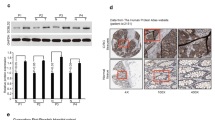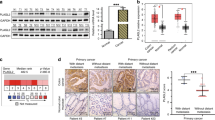Abstract
Purpose
Metastasis is a primary cause of colorectal cancer (CRC)-related death, and cancer stem cells (CSCs) are thought to be majorly responsible for initiating metastatic behaviors. Doublecortin-like kinase 1 (DCLK1) was recently discovered to be a marker for gastrointestinal CSCs. Here, we aimed to explore whether DCLK1 is associated with CRC metastasis through clinical and in vitro investigations.
Methods
The expression levels of DCLK1 mRNA and protein in human CRC tissues were analyzed through quantitative RT-PCR and immunohistochemistry staining, respectively. Human CRC cell line SW480 was selected to explore the effect of DCLK1 overexpression on cell migration and invasion. Besides, the associations between DCLK1 and epithelial–mesenchymal transition (EMT) were determined.
Results
Compared to normal colorectal tissues, DCLK1 expression was significantly up-regulated in human CRC tissues and correlated well with high lymphatic metastasis and poor prognosis in patients. DCLK1 expression was inversely associated with overall survival in CRC patients. Overexpression of DCLK1 in SW480 cells markedly promoted cell migration and invasion. Furthermore, we validated that DCLK1 could facilitate EMT in cancer cells by up-regulation of the mesenchymal markers Vimentin and ZEB1 and down-regulation of the epithelial marker E-cadherin in SW480 cells.
Conclusions
DCLK1 up-regulation may play a contributory role in CRC metastasis and poor prognosis via activation of EMT. DCLK1 may serve as an independent predictor for CRC prognosis.




Similar content being viewed by others
Abbreviations
- DCLK1:
-
Doublecortin-like kinase 1
- CRC:
-
Colorectal cancer
- TCGA:
-
The Cancer Genome Atlas
- AJCC:
-
American Joint Committee on Cancer
- MAPs:
-
Microtuble-associated proteins
- DCX:
-
Doublecortin
- CSCs:
-
Cancer stem cells
- EMT:
-
Epithelial–mesenchymal transition
- TNM:
-
Tumor node metastasis
- ATCC:
-
American Type Culture Collection
- OS:
-
Overall survival
- HR:
-
Hazard ratio
- CI:
-
Confidence interval
- SD:
-
Standard deviation
References
Cerami E et al (2012) The cBio cancer genomics portal: an open platform for exploring multidimensional cancer genomics data. Cancer Discov 2:401–404. doi:10.1158/2159-8290.cd-12-0095
Chaffer CL, Weinberg RA (2011) A perspective on cancer cell metastasis. Science (New York, NY) 331:1559–1564. doi:10.1126/science.1203543
Christofori G (2006) New signals from the invasive front. Nature 441:444–450. doi:10.1038/nature04872
Gagliardi G, Moroz K, Bellows CF (2012) Immunolocalization of DCAMKL-1, a putative intestinal stem cell marker, in normal colonic tissue. Pathol Res Pract 208:475–479. doi:10.1016/j.prp.2012.05.015
Gao J et al (2013) Integrative analysis of complex cancer genomics and clinical profiles using the cBioPortal. Sci Signal 6:pl1. doi:10.1126/scisignal.2004088
Kantara C, O’Connell MR, Luthra G, Gajjar A, Sarkar S, Ullrich RL, Singh P (2015) Methods for detecting circulating cancer stem cells (CCSCs) as a novel approach for diagnosis of colon cancer relapse/metastasis. Lab Investig 95:100–112. doi:10.1038/labinvest.2014.133
Li L, Bellows CF (2013) Doublecortin-like kinase 1 exhibits cancer stem cell-like characteristics in a human colon cancer cell line Chin. J Cancer Res 25:134–142. doi:10.3978/j.issn.1000-9604.2013.03.02
Liang X (2011) EMT: new signals from the invasive front. Oral Oncol 47:686–687. doi:10.1016/j.oraloncology.2011.04.016
Lin PT, Gleeson JG, Corbo JC, Flanagan L, Walsh CA (2000) DCAMKL1 encodes a protein kinase with homology to doublecortin that regulates microtubule polymerization. J Neurosci 20:9152–9161
May R et al (2009) Doublecortin and CaM kinase-like-1 and leucine-rich-repeat-containing G-protein-coupled receptor mark quiescent and cycling intestinal stem cells, respectively. Stem Cells 27:2571–2579. doi:10.1002/stem.193
Mirzaei A et al (2015a) Upregulation of circulating cancer stem cell marker, DCLK1 but not Lgr5, in chemoradiotherapy-treated colorectal cancer patients. Tumour Biol J Int Soc Oncodev Biol Med 36:4801–4810. doi:10.1007/s13277-015-3132-9
Mirzaei A et al (2015b) A new insight into cancer stem cell markers: Could local and circulating cancer stem cell markers correlate in colorectal cancer? Tumour Biol J Int Soc Oncodev Biol Med. doi:10.1007/s13277-015-3989-7
Mitra A, Mishra L, Li S (2015) EMT, CTCs and CSCs in tumor relapse and drug-resistance. Oncotarget 6:10697–10711. doi:10.18632/oncotarget.4037
Nakanishi Y et al (2013) Dclk1 distinguishes between tumor and normal stem cells in the intestine. Nat Genet 45:98–103. doi:10.1038/ng.2481
O’Connell JB, Maggard MA, Ko CY (2004) Colon cancer survival rates with the new American Joint Committee on Cancer sixth edition staging. J Natl Cancer Inst 96:1420–1425. doi:10.1093/jnci/djh275
Qu D et al (2015) Doublecortin-like kinase 1 is elevated serologically in pancreatic ductal adenocarcinoma and widely expressed on circulating tumor cells. PLoS One 10:e0118933. doi:10.1371/journal.pone.0118933
Schreuders EH, Ruco A, Rabeneck L, Schoen RE, Sung JJ, Young GP, Kuipers EJ (2015) Colorectal cancer screening: a global overview of existing programmes. Gut 64:1637–1649. doi:10.1136/gutjnl-2014-309086
Siegel RL, Miller KD, Jemal A (2016) Cancer statistics, 5016. CA Cancer J Clin 66:7–30. doi:10.3322/caac.21332
Soini Y et al (2011) Transcription factors zeb1, twist and snai1 in breast carcinoma. BMC Cancer 11:73. doi:10.1186/1471-2407-11-73
Stein U, Schlag PM (2007) Clinical, biological, and molecular aspects of metastasis in colorectal cancer. Recent Results Cancer Res 176:61–80
Sureban SM et al (2011) Nanoparticle-based delivery of siDCAMKL-1 increases microRNA-144 and inhibits colorectal cancer tumor growth via a Notch-1 dependent mechanism. J Nanobiotech 9:40. doi:10.1186/1477-3155-9-40
Sureban SM et al (2014) XMD8-92 inhibits pancreatic tumor xenograft growth via a DCLK1-dependent mechanism. Cancer Lett 351:151–161. doi:10.1016/j.canlet.2014.05.011
Sureban SM et al (2015) Plasma DCLK1 is a marker of hepatocellular carcinoma (HCC): targeting DCLK1 prevents HCC tumor xenograft growth via a microRNA-dependent mechanism. Oncotarget 6:37200–37215. doi:10.18632/oncotarget.5808
Tsai JH, Yang J (2013) Epithelial-mesenchymal plasticity in carcinoma metastasis. Genes Dev 27:2192–2206. doi:10.1101/gad.225334.113
Vega KJ et al (2012) Identification of the putative intestinal stem cell marker doublecortin and CaM kinase-like-1 in Barrett’s esophagus and esophageal adenocarcinoma. J Gastroenterol Hepatol 27:773–780. doi:10.1111/j.1440-1746.2011.06928.x
Weygant N et al (2014) Small molecule kinase inhibitor LRRK2-IN-1 demonstrates potent activity against colorectal and pancreatic cancer through inhibition of doublecortin-like kinase 1. Mol Cancer 13:103. doi:10.1186/1476-4598-13-103
Acknowledgments
This work was supported by grants from National Natural Science Foundation of China (No. 81572825, to Guangyu An). Beijing Municipal Health System High-level Talent Training Project (to Tao Wen), Beijing, P. R. China. National Natural Science Foundation of China (Youth fund project, No. 81502384, to Jian Liu).
Author information
Authors and Affiliations
Corresponding authors
Ethics declarations
Conflict of interest
The authors declare that they have no conflicts of interest.
Ethical approval
All procedures performed in studies involving human participants were in accordance with the ethical standards of the institutional and national research committee and with the 1964 Helsinki Declaration and its later amendments or comparable ethical standards.
Informed consent
Informed consent was obtained from all individual participants included in the study.
Additional information
Tianbo Gao and Min Wang contributed equally to this work.
Rights and permissions
About this article
Cite this article
Gao, T., Wang, M., Xu, L. et al. DCLK1 is up-regulated and associated with metastasis and prognosis in colorectal cancer. J Cancer Res Clin Oncol 142, 2131–2140 (2016). https://doi.org/10.1007/s00432-016-2218-0
Received:
Accepted:
Published:
Issue Date:
DOI: https://doi.org/10.1007/s00432-016-2218-0




